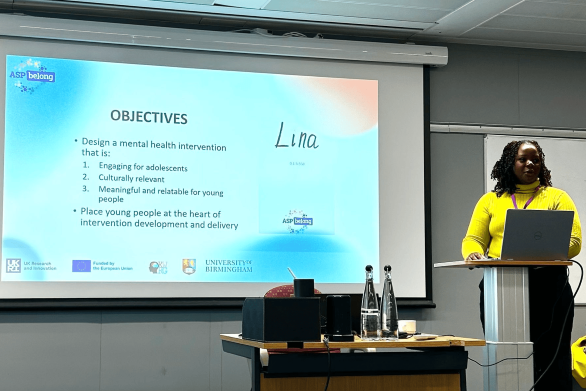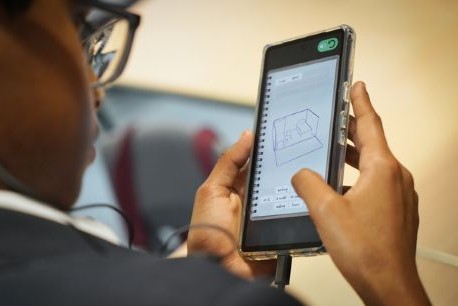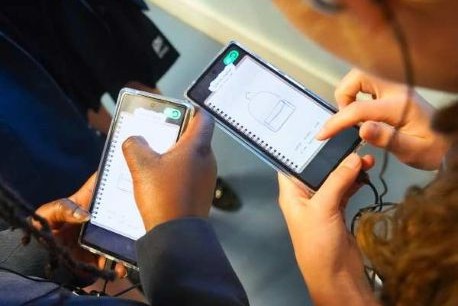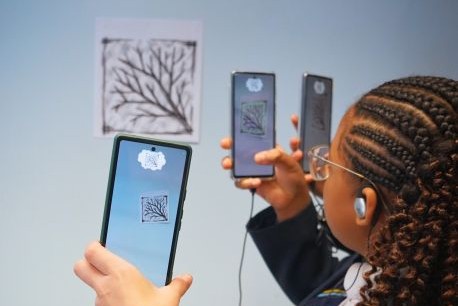
newsletter
What conditions allow young people to feel genuinely “at home”? Philosopher and senior postdoctoral researcher Valeria Motta from the ASPbelong team uncovers surprising patterns in how belonging forms, breaks, and repairs itself.
Read more
newsletter
The ASPbelong project members attended the Psychology of Education Annual Conference 2025, where they shared insights on implementing the Lina intervention across schools in three countries.
Read more
blog
What makes a classroom feel like it belongs together? This fall, students aged 12-13 in grades 7-8 across the UK, Czech Republic and Portugal are helping us find out, by playing a game!
Read more
publication
When thinking about ethics during the development of mental healthcare technologies most people think about research ethics related to how to involve test users in a safe way. Broadening the scope of ethical questions, an article by our ethics team provides a new practical method for integrating ethics across the full development cycle.
Read more
newsletter
A recent deadly school shooting in Graz, Austria, has prompted urgent government plans to expand mental health workshops and double the number of school psychologists by 2027. While these steps are welcome, waiting for extreme crises to drive change risks too much.
Read more
newsletter
Why is there hesitation to put mental health programmes into practice, even when they’re proven to work? Our latest study explores the beliefs that can act as barriers, and how simple, targeted messages might help change minds. We surveyed over 1,000 parents, teachers and policymakers across the UK, Portugal and Czechia to test what works and why. The findings will help us create more effective ways to support young people’s mental health and belonging in schools.
Read more
newsletter
This summer, the ASPbelong team has been gearing up to undertake three parallel randomised controlled trials of Lina in 120 classrooms in the UK, Portugal, and Czechia.
Read more
newsletter
What are the ethical challenges in developing digital mental health games for young people? Our new review explores how researchers have addressed or not addressed ethical issues in existing gamified interventions.
Read more
newsletter
In our project, we regularly consult young people to understand their opinions, interests, and preferences. We asked our colleagues from the Unicorn Theatre to share their thoughts on working with 10 amazing young people who have provided invaluable input to our work over the past year.
Read more
newsletter
What stands for ‘ASP’ and why do we care so much about belonging? Adam Barnard, our creative lead, explains a concept of Augmented Social Play (ASP) and shows an example of our first ASP called ‘Lina’ that engages a whole class in a mystery solving game.
Read more
news
Throughout 2024, we successfully organised three cultural exchanges involving 28 young people aged 12–14 from Czechia, Portugal, and the UK. These exchanges aimed to connect creativity, innovation, and young voices to support our work on collaborative immersive experiences for young people.
Read more
publication
Our team members Wanda Spahl, Valeria Motta, Kate Woodcock and Gionvanni Rubeis have published an article on the ethical challenges in developing digital mental health games for young people.
Read more
Funded by the European Union. Views and opinions expressed are however those of the author(s) only and do not necessarily reflect those of the European Union or the European Health and Digital Executive Agency (HaDEA). Neither the European Union nor the granting authority can be held responsible for them.

This work is co-funded by UK Research and Innovation (UKRI) under the UK government’s Horizon Europe funding guarantee [grant numbers 10076369, 10077956, 10079657, 10083622, tbc].

This work is co-funded by UK Research and Innovation (UKRI) under the UK government’s Horizon Europe funding guarantee [grant numbers 10076369, 10077956, 10079657, 10083622, tbc].